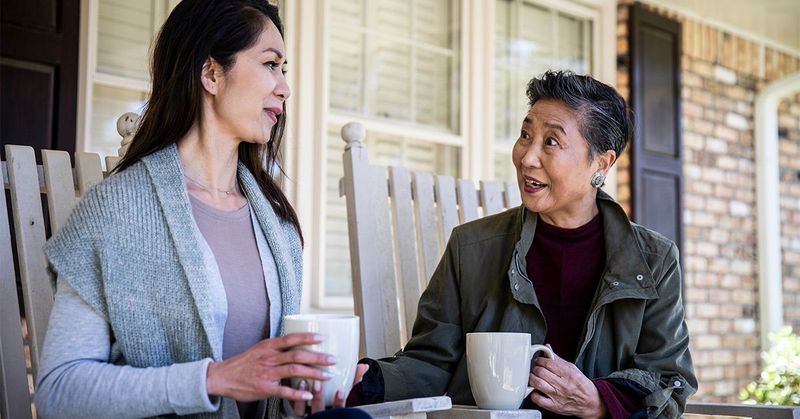10 Things You Only Learn After Becoming Best Friends With Your Parents as an Adult

Growing up, we often see our parents as authority figures rather than potential friends. But something magical happens when we reach adulthood – the relationship can transform into a genuine friendship. This shift brings unexpected discoveries about them, yourself, and the bond you share. Here’s what happens when parents become your adult best friends.
1. You Grieve Lost Time While Cherishing What Remains

Regret sneaks up on you when you realize how much closer you could have been during your younger years. Those teenage arguments and misunderstandings seem so trivial now.
Yet this awareness brings a special urgency to your relationship today. You find yourself scheduling regular calls, planning visits, and documenting moments together with a new appreciation.
The past has shaped your connection, giving it depth and perspective. Each conversation now carries the weight of understanding that wasn’t possible before, making every moment together more meaningful than ever.
2. Surprising Similarities Emerge Over Coffee or Wine

The first time you share a glass of wine and truly talk as equals, you’re startled by how familiar their stories feel. Their college mishaps, career doubts, and relationship struggles mirror your own experiences in unexpected ways.
Your dad’s dry humor suddenly makes sense because it’s exactly how you cope with stress. Mom’s tendency to overthink situations isn’t annoying anymore—it’s the same trait that keeps you up at night.
These shared traits create a bridge between generations. You find comfort knowing they once navigated the same uncertainties you face now.
3. Forgiveness Flows Both Ways Without Expectation

Somewhere between heartfelt conversations and quiet moments together, the grudges dissolve. You stop holding them to impossible standards when you realize they were learning as they went along.
More surprising is forgiving yourself—for the harsh words, the slammed doors, the years of misunderstanding. This mutual grace happens naturally, rarely through formal apologies.
The healing unfolds in small moments: when your mother mentions a difficult period without blame, or when your father acknowledges your perspective without defensiveness. These exchanges create space for a relationship based on who you are now, not who you once were.
4. Their Flaws Become Their Most Endearing Qualities

Remember how your dad’s terrible singing voice embarrassed you as a teenager? Now you find yourself smiling when he belts out off-key tunes while washing dishes. Those quirks that once mortified you have become beloved characteristics.
Your mother’s tendency to fuss over small details transforms from annoying to endearing. You recognize these traits as expressions of their authentic selves, not imperfections to be fixed.
Their humanity—complete with odd habits, stubborn opinions, and occasional lapses in judgment—makes them real. This unfiltered view creates a deeper connection than the pedestaled version of parenthood ever could.
5. Their Youth Comes Into Focus Through Adult Eyes

The math hits you suddenly—they were only 28 when facing that major family crisis. Looking at photos from your childhood, you’re struck by how young they appear, juggling mortgages, careers, and parenting without instruction manuals.
You see your thirty-something friends struggling with basic adulting and realize your parents managed far more at the same age. This revelation brings a wave of compassion for their mistakes and admiration for their successes.
The timeline of their lives unfolds with new clarity. You understand why certain decisions were made and appreciate the weight of responsibilities they carried while you were blissfully unaware.
6. The Advice Highway Reverses Direction

“What do you think I should do?” The first time your parent asks this question seriously, it catches you off-guard. There’s a moment of disorientation as you realize they genuinely want your perspective.
Gradually, you become their tech support, travel consultant, and sometimes even their relationship advisor. Your father calls before making a major purchase; your mother asks about retirement planning strategies.
This role reversal feels strange but satisfying. Their trust in your judgment affirms your growth and maturity while creating a more balanced relationship. The wisdom exchange becomes a two-way street, enriching both your lives.
7. You Recognize Your Inheritance Beyond Genetics

The gesture catches you mid-conversation—your hand wave mirrors your mother’s exactly. You hear yourself use your father’s favorite phrase and smile instead of cringing.
These inherited traits feel like treasures now, not burdens. Your mother’s resilience surfaces when you face challenges. Your father’s problem-solving approach becomes your professional strength.
Even their contradictions make more sense: how your dad can be both stubborn and flexible, how your mom balances caution with spontaneity. These complexities have shaped your own ability to hold opposing truths. Their imprint on your identity becomes a source of pride rather than resistance.
8. Love Transforms From Obligation To Genuine Affection

Family gatherings once felt like mandatory attendance events. Now you catch yourself extending visits and feeling disappointed when they end.
You call not because it’s Sunday and you “should,” but because you genuinely want to share your day. Their company becomes something you seek rather than endure. This shift happens so gradually you barely notice until you realize you’ve just spent two hours on the phone without checking the time once.
The love deepens because it’s rooted in appreciation for who they truly are—not just their role in your life. You value their humor, wisdom, and unique perspectives in ways that transcend the parent-child dynamic.
9. Conversations Reach Refreshing New Depths

The first time your father shares his childhood insecurities or your mother reveals her biggest regrets, the world tilts slightly. These vulnerable exchanges create a new dimension in your relationship.
Topics once considered off-limits—politics, religion, past mistakes—become fair game for thoughtful discussion. You find yourself sharing personal struggles you previously kept hidden, trusting their response will come from love rather than judgment.
This emotional honesty creates a profound connection. The pretense falls away, replaced by authentic exchanges that acknowledge both your strengths and weaknesses. These conversations become treasured moments that strengthen your bond in unexpected ways.
10. Boundaries Become Acts Of Mutual Respect

Learning to say “I need some space” or “I’d rather not discuss that” feels revolutionary. Even more surprising is how well they receive these boundaries when expressed with love and clarity.
You discover that limits actually bring you closer. Respecting each other’s independence creates room for healthier interactions. Those old family patterns that once sparked tension can be gently redirected without drama.
The dance of connection and separation becomes more graceful with practice. You both understand that sometimes loving each other means stepping back, giving space, or changing the subject. This mutual respect forms the foundation of your adult friendship.

Comments
Loading…